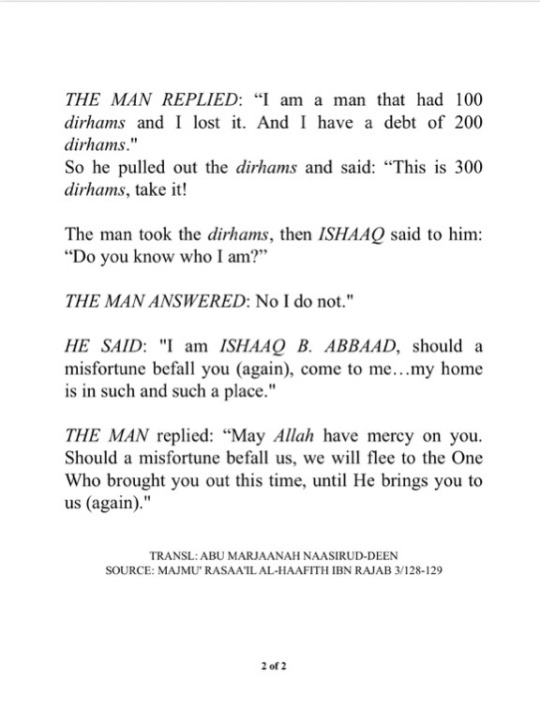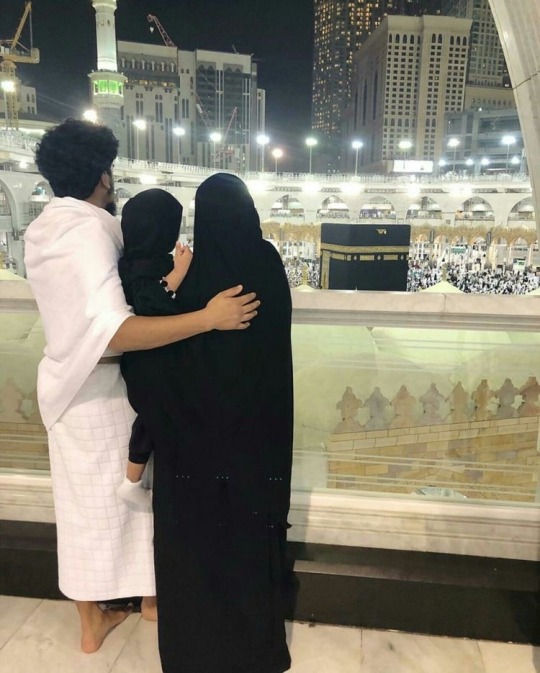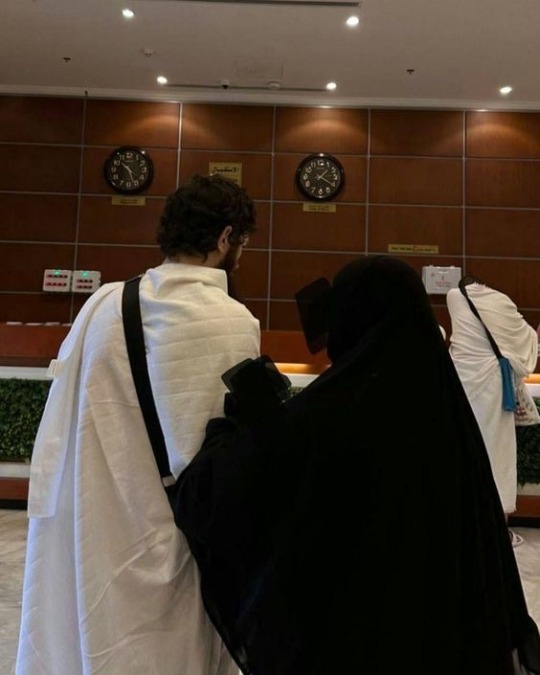#sayings of the salaf
Text
Ibn al-Qayyim رحمه الله said:
“The person who treats others kindly and thinks well of them, will find that his intention will remain true, he will feel at ease, his heart will be sound and Allah will protect him from evil and calamity.”
[Madarij al-Salikeen | 2/511]
#islam#sayings of the salaf#muslim#sunnah#religion#quranandsunnah#salaf#islamicquotes#islamicreminders#islamic reminders
485 notes
·
View notes
Text
Hadith
حَدَّثَنَا خَالِدُ بْنُ مَخْلَدٍ، حَدَّثَنَا سُلَيْمَانُ، قَالَ حَدَّثَنِي عَمْرُو بْنُ أَبِي عَمْرٍو، قَالَ سَمِعْتُ أَنَسًا، قَالَ كَانَ النَّبِيُّ صلى الله عليه وسلم يَقُولُ " اللَّهُمَّ إِنِّي أَعُوذُ بِكَ مِنَ الْهَمِّ وَالْحَزَنِ، وَالْعَجْزِ وَالْكَسَلِ، وَالْجُبْنِ وَالْبُخْلِ، وَضَلَعِ الدَّيْنِ، وَغَلَبَةِ الرِّجَالِ ".
Narrated Anas bin Malik:
The Prophet (ﷺ) used to say, "O Allah! I seek refuge with You from worry and grief, from incapacity and laziness, from cowardice and miserliness, from being heavily in debt and from being overpowered by (other) men." (See Hadith No. 374)
Sahih al-Bukhari, 6369
#islam#islamicquotes#welcome to islam#manhaj salaf#salaffiyah#sayings of the salaf#salaf#salafushalih#hadith#quran#dawah#sunnah
175 notes
·
View notes
Text









#islamic quotes#sayings of the salaf#salafiyyah#manhaj salaf#hadith#islam#sunnah#أقوال السلف#آثار السلف#quran#الحديث النبيوي#أخلاق#أهل السنة#السنة النبوية#الصحابة#islamicposts#islamic reminders#islamic knowledge#السنة#الإيمان#الإسلام#دين الإسلام
104 notes
·
View notes
Text
Shaykh Ibn Uthaymeen -Rahimahullaah- said:
'When a person counters afflictions with patience but without hoping for a reward then the result is an expiation for his sins, however if he is patient along with hoping for a reward then the condition becomes such that along with expiation of sins, there is a reward and recompense.
The meaning of hoping for a reward is that a person believes that he will be rewarded for this patience, so he has good thoughts about Allaah and therefore, Allaah will give him what he thought of Allaah.'
[ta-Taleeq ala Saheeh Muslim p.342]
Translated By Abbas Abu Yahya
48 notes
·
View notes
Text
Ibn Al-Qayyim رحمه الله said:
“How strange does it seem, that these tests which weigh a ton on our chest today will one day elevate us. Elevate us so high, that we will thank Allāh. We will thank Him for testing us, for loving us and for giving us more than anyone could imagine.”
[Al-Fawā’id | Pg. 119]
#ibn al qayyim#islamquotes#tawheed#salafiyyah#manhaj salaf#salaf#sayings of the salaf#allahuakbar#alhamdulillah#islam#reminder
81 notes
·
View notes
Text
One of the most beautiful narrations I’ve ever read, regarding tawakkul🍃🍃✨✨✨✨🍃🍃
May Allāh increase us in Tawhīd!


#tawakkul#tawhid#salafiyyah#ahlus sunnah wal jama'ah#soundcloud#salafussalih#sayings of the salaf#tawheed#tawhīd#deenislam#salafiyun#salafi#convert to islam#islam#islamicreminders#islamquotes#t
60 notes
·
View notes
Text




me and who and when ya Allah🥺
images source: pinterest
#islam#islamic#muslim#convert to islam#ahlussunnahwaljamaah#life#ahlusunnah#salafi#salafushalih#sayings of the salaf#muslim couple#makkah#makkahalmukarramah#madinah#madinahalmunawwarah#masjid al aqsa#masjid al haram#masjidalnabawi
81 notes
·
View notes
Text
Ibn al-Qayyim رحمه الله:
"When the heart becomes agitated and restless, there is nothing that can bring tranquillity to it except for the remembrance of Allāh."
{بدائع التفسير ٨٨/٢}
#allah#muslim#islamicquotes#islam#islamicreminder#quran#islamicquote#sunnah#islamicpost#islamicreminders#salaffiyah#sayings of the salaf#salafiyyah#salaf#salafi#tawheed#tauheed#tauhid#islam quran muslim allah islamicquotes#quranreminder#quranandsunnah
695 notes
·
View notes
Text
A befitting reply to fake friends and two-faced flatterers
A man was praising Ali ibn Abu Talib (raḍiya 'llāhu 'an-hu) abundantly upon his tounge with that which was not within his heart. So Ali said to him:
"I am beneath that which you say but above that which (you are concealing) within yourself."
[As-Samt by Ibn Abid-Dunya pg.275 and Ibn 'Asakir within Tarikh Ad-Dimashq 42/518]
(Translated by Raha Batts)
8 notes
·
View notes
Text
Ibn al-Qayyim رحمه الله said:
“The Cause of Anxiety is Sins.”
[Ad-dawad Dawah p.21 ]
#muslim#islam#religion#sunnah#quranandsunnah#salaf#islamic reminders#sayings of the salaf#islamicquotes#islamicreminders
454 notes
·
View notes
Text
Ibn-al Jawzi رحمه الله said:
“Beware of procrastination for it is the highest ranking soldier of Iblis.”
[Sayd al-Khaatir, pg. 466-467]
#islam#islamicquotes#welcome to islam#manhaj salaf#salaffiyah#sayings of the salaf#salaf#salafushalih#hadith#quran#sunnah#dawah
276 notes
·
View notes
Text
الأخذ بالأسباب لا ينافي التوكل
:قال الإمام ابن القيم رحمه الله تعالى
وسرُّ التوكل وحقيقته هو اعتمادُ القلب على الله وحدَه: فلا يضرُّه مباشرةُ الأسباب؛ مع خلوِّ القلب من الاعتماد عليها والركون إليها.
[الفوائد، ص١٢٦]
Al-Imām Ibnul-Qayyim, may Allāh have mercy upon him said:
“The secret and reality of tawakkul is the heart’s reliance upon Allāh alone, so taking the [permissable] means does not harm it (i.e. tawakkul) whilst the heart is free from relying upon these means and becoming dependant upon them.”
[Al-Fawāid, pg.126]
#Fawaaid#islamic quotes#salafiyyah#islam#manhaj salaf#sayings of the salaf#sunnah#أقوال السلف#آثار السلف#islamic post#islamic knowledge#التوكل#العبادة#ابن القيم#ibn al qayyim#السلفية#منهج السلف#الصبر
47 notes
·
View notes
Text
29 notes
·
View notes
Text
Yaḥyā b. Muʿādh said: "Don’t delay an answer to your duʿāʾ by blocking its path with sins."
{شعب الإيمان جلد ٢، صحفة ٥٤}
33 notes
·
View notes
Text
🪴~ Read, Reflect, Take Heed
Al-Ḥāfiẓ ibn Rajab — رحمه الله — said:
And 'Istiqāmah' (uprightness or straightness): it is the act of journeying on the straight path, which is the upright religion, without deviating to the right or the left. This includes performing all acts of obedience, both outward and inward, and also includes avoiding all that is prohibited in the same regard (i.e., avoiding the prohibitions of the heart and the body).
[Tafsīr Ibn Rajab (2/263); Jāmīʿ al ʿUlūm wal Hikam (ḥadīth 21)] Taken from the book: Fleeing to Allāh: The Salaf & the Journey of Inner Growth |By Abū Suhailah ʿUmar Quinn|
#soundcloud#salafiyyah#ahlus sunnah wal jama'ah#salafi#salafussalih#tawheed#tawhīd#sayings of the salaf#salafiyun#deenislam#ibn qayyim#salaffiyah#salaf#tawhid#salafi group chat
6 notes
·
View notes
Text
Abū Dharr رضي اللّٰه عنه said: “My khalīl (intimate friend, i.e. Rasūlullāh) ﷺ commanded me with seven [matters]:
1. He commanded me to love the poor and draw close to them
2. He commanded me to look at those who are below me and not to look at those who are above me (in terms of worldly matters)
3. He commanded me to maintain the ties of kinship even if it seeks to draw away
4. He commanded me not to ask anyone for anything
5. He commanded me to speak the truth even if it is bitter
6. He commanded me not to fear the blame of the blamers
7. He commanded me to increase in saying: لا حول ولا قوة إلا باللّٰه , for this is a treasure under the Throne [of Allāh].”
[Reported by Aḥmad, graded 'Ḥasan' by Sheikh Muqbil raḥimahullāh in Al-Jāmi’ Aṣ-Ṣaḥīḥ]
#islam#life#islamic#muslim#convert to islam#tawheed#welcome to islam#salafushalih#prophet muhammed pbuh#deen#salafi#sayings of the salaf#salafiyyah#ahlussunnahwaljamaah#ahlusunnah
57 notes
·
View notes